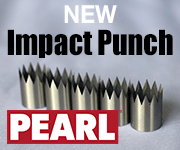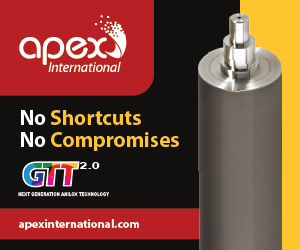The Cadillac of Corrugated: Tri-Wall
- Published: December 01, 2001, By Teresa Koltzenburg, Senior Editor
In pop-culture terms, some might define 2001 as totally Yugo (apologies to you Yugo lovers). But while the mechanics of world relations continue in confusion, it's good to know there's still Cadillac-level converting operations advancing steadily on this rough road.
Tri-Wall of Butler, IN, is such a self-titled operation. “This plant has always been viewed as the Cadillac of the triple-wall corrugated business,” proudly states John Chambers, Tri-Wall's GM, “largely due to our strong quality programs and customer focus.”
Tri-Wall makes industrial packaging, “triple-wall” containers from four layers of linerboard and three layers of corrugated, all precisely meshed during manufacture. The almost-250,000-sq-ft plant, says Chambers, is dedicated solely to this enterprise. “The high strength-to-weight ratio of triple-wall makes it preferable for large, one-piece containers and for containers that need high burst strength and puncture resistance.”
Giant-sized commercial appliance packaging, large agricultural shipping bins (which can be loaded in the field, then instantly converted to display units in the supermarket); specially designed protective packaging for automotive engines and parts; and containers for small, fragile electronics parts: Tri-Wall manufactures all of this unique packaging with several machines. The company recently added a 75×185-in. Ward Jumbo flexo folder/gluer, which is equipped with in-line die-cutting, two-color flexographic printing capability, and computer-controlled setup. “The Ward folder/gluer is designed to handle bulk containers in one pass, ultimately resulting in faster turnaround time,” Chambers reports.
The Cadillac Connection
Chambers attributes Tri-Wall's eminence to the operation's keen focus on quality and customer service. “Because of this, we've seen significant growth in our customer base over the past three years.” While streamlining production flow and more efficient scheduling on its one flexo folder/gluer helped Tri-Wall support its growth, the need for additional capacity became evident. “More capacity was a necessity at the heart of production, in the flexo folder/gluer operation, where the final containers are made,” recalls Chambers.
“To keep our quality commitment of giving our customers exactly what they ordered when it was promised, we felt it essential we increase our capacity.”
Thus, Tri-Wall ordered the Ward Machinery Jumbo flexo folder/gluer. “This is a giant among flexo folder/gluer machines,” says Chambers. “It can handle a corrugated blank that's 96 by 186 inches using the skip feed, or, using the regular feed, 70 by 183 inches. This size blank is important, because it sets the upper limits for one-piece containers.”
The decision to add a second Jumbo flexo folder/gluer was made after examining the product mix and order flow, Chambers explains. “The Ward Jumbo has not only the capacity for large blanks but also can handle much smaller blanks and has an in-line, two-color flexo press, which provides a great deal of flexibility to the scheduler.” And flexibility is critical for the Butler plant, which places heavy emphasis on quality and custom-designed containers.
In these days of short runs, changing specifications, and high demands, Tri-Wall determined that operating two large flexo folder/gluers would help retain its leadership position and continue its tradition of quality and service.
Certifiably Good
Most of Tri-Wall's corrugated containers are used in the industrial and agricultural sectors. “But,” notes Chambers, “about 10 percent of our triple-corrugated sheets are sold to other converting operations for further conversion into specialty applications and products.”
Because of its use in secondary food contact, Tri-Wall's product has earned certification from the American Inst. of Baking (AIB).
The Butler plant has been ISO-certified since 1997. Tri-Wall quality manager Marc Everetts is proud of the plant's certifications, but he's quick to point out that quality means a lot more than just meeting specifications or passing audits. “Our quality policy is designed to always provide defect-free products and services that meet or exceed the requirements of our customers — exactly as they have been promised.”
Part of the Weyerhauser bulk packaging group, Tri-Wall concentrates on quality so intently, it takes ISO certification one step further. “At the Butler plant,” explains Everetts, “we certify all of our suppliers, and we monitor their performance to make sure they continue to provide the right products for our customers.”
In addition, he says, the Butler plant aspires to be certified to the ISO-2000 standard. “The re-certification team is being trained to audit to the 2000 standard specifications,” he adds.
The operation's AIB certification has positioned Tri-Wall's product as a practical solution for many end-users. “The flexibility and usefulness of the Tri-Wall product has few limits in the marketplace,” says Everetts. “And its use as a food container is part of its remarkable success.”
AIB certification requires a yearly audit of an operation's support systems and the physical condition of the facility, Everetts explains. “They audit our pest control program, as well as our processes for cleanliness.
“Our program operates on a daily, weekly, and monthly schedule, with different measurements and criteria covered at each inspection. To support this, we have a committee for housekeeping, and we give monthly recognition to the department that has the highest score in the plant. We also give a trophy to the department that is the most improved.”
Reports Everetts, “Our in-place processes — which ensure their products are produced in a clean environment, free of contamination — are of great benefit to our customers. Right now, we supply to a broad range of food segments — produce, meat packers (that use a poly liner), pasta, granola, nuts, sugar beets, and potatoes.”
The Trick of Tri-Wall
Tri-Wall's corrugated production begins with an 87-in. corrugator (recently upgraded for increased speeds and quality), which Chambers says can produce 330-in.-long sheets and has color-coating capability. In addition to the Ward flexo folder/gluer, the company operates an Advance jumbo-sized flexo folder/gluer, also equipped with in-line die-cutting. Tri-Wall's Butler plant prints with a Ward 66×144-in. flexo press and also operates a Notchfold machine capable of handling sheets to 330 in. long. (According to the company, Advance is no longer in business, and the Notchfold machine is a custom-designed, proprietary-type piece of capital.)
Known for its strength, Tri-Wall's triple-wall product replaces wooden shipping containers (see sidebar, p. 44). “The linerboard and corrugated medium are fed from large rolls into the corrugator, where they are built up layer by layer with special adhesive and head dried to form a rigid paper product,” explains Everetts. “It's nearly as strong as wood with only 20 percent of the weight.”
He adds, “It's the strength-to-weight ratio that makes triple-wall such an important product in the marketplace.”
And Tri-Wall's commitment to quality and service are what make its converting industry contribution worthy of Cadillac class.
Tri-Wall TOUGH
Surely 20-ft long wirebound wooden boxes are tough enough to ship electrical conduit tubing? Of course, they're tough enough, but an electrical-tubing manufacturer found the boxes too costly to assemble, warehouse, and ship, says Tri-Wall.
To solve this cost conundrum, Tri-Wall engineers set to work and designed a package consisting of two Notchfold-scored T-W Pak® 1300 (Class 2) fiberboard sheets and two wood end blocks, secured by Tri-Wall nails and banded to seam the two sheet units together. The unique Notchfold score, which is a special 45-deg groove cut into the top two layers of the Tri-Wall Pak® board, permits the panels to be folded to a perfect 90-deg corner easily.
According to Tri-Wall, these small nuances of packaging design make the final packaging solution as strong as the original container, but with less weight, less cost, and increased product protection during shipping.
SUPPLIER INFORMATION
Ward Machinery, Baltimore, MD; ph: 410/584-7700.












